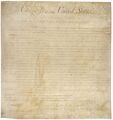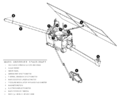Template:Selected anniversaries/September 25: Difference between revisions
No edit summary |
No edit summary |
||
| Line 41: | Line 41: | ||
||1933: Paul Ehrenfest born ... theoretical physicist, who made major contributions to the field of statistical mechanics and its relations with quantum mechanics, including the theory of phase transition and the Ehrenfest theorem. | ||1933: Paul Ehrenfest born ... theoretical physicist, who made major contributions to the field of statistical mechanics and its relations with quantum mechanics, including the theory of phase transition and the Ehrenfest theorem. | ||
||1935: Adrien Douady born ... mathematician. | ||1935: Adrien Douady born ... mathematician. Pic. | ||
||1955: Franz Rellich dies ... mathematician. He made important contributions in mathematical physics, in particular for the foundations of quantum mechanics and for the theory of partial differential equations. The Rellich–Kondrachov theorem is named after him. | ||1955: Franz Rellich dies ... mathematician. He made important contributions in mathematical physics, in particular for the foundations of quantum mechanics and for the theory of partial differential equations. The Rellich–Kondrachov theorem is named after him. | ||
| Line 47: | Line 47: | ||
||1956: TAT-1, the first submarine transatlantic telephone cable system, is inaugurated. | ||1956: TAT-1, the first submarine transatlantic telephone cable system, is inaugurated. | ||
||1968: Hans F. K. Günther dies ... eugenicist and academic. | ||1968: Hans F. K. Günther dies ... eugenicist and academic. Pic. | ||
||1969: Paul Hermann Scherrer dies ... physicist. Pic. | ||1969: Paul Hermann Scherrer dies ... physicist. Pic. | ||
Revision as of 06:32, 27 September 2019
1644: Astronomer and instrument maker Ole Rømer born. He will make the first quantitative measurements of the speed of light.
1777: Polymath Johann Heinrich Lambert dies. He made important contributions to mathematics, physics (particularly optics), philosophy, astronomy, and map projections.
1789: The United States Congress passes twelve amendments to the United States Constitution: The Congressional Apportionment Amendment (which was never ratified), the Congressional Compensation Amendment, and the ten that are known as the Bill of Rights.
1819: Mathematician and Anglican theologian George Salmon born. He will work in algebraic geometry for two decades, then devote the last forty years of his life to theology.
1845: Judge Havelock With Glass is "a reasonably accurate depiction of events as I experienced them," according to the Judge.
1893: Mathematician and statistician Harald Cramér born. He will help found probability theory as a branch of mathematics, writing in 1926: "The probability concept should be introduced by a purely mathematical definition, from which its fundamental properties and the classical theorems are deduced by purely mathematical operations."
1992: NASA launches the Mars Observer, a $511 million probe to Mars, in the first U.S. mission to the planet in 17 years. The probe will fail eleven months later.
2002: Steganographic analysis of Humpty Dumpty At Bat reveals previously unknown biography of Babe Ruth by Lewis Carroll.
2003: Journalist, writer, literary editor, and actor George Plimpton dies.
2018: Chromatographic analysis of Yellow Spiral unexpectedly reveals "at least five new shades of the color yellow, perhaps as many as nine."
2017: Dennis Paulson of Mars says that the twenty-fifth anniversary of the launch of the Mars Observer is a bittersweet event, because the spacecraft will be lost eleven months later.










